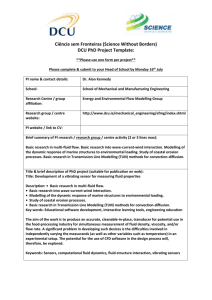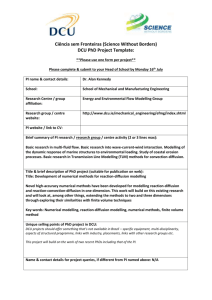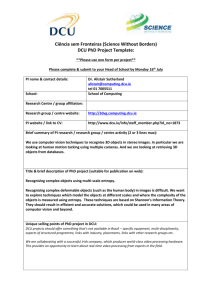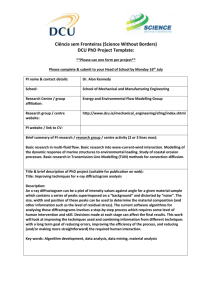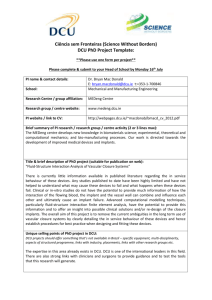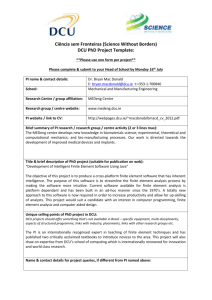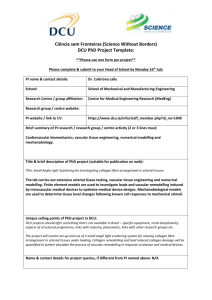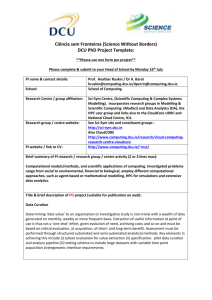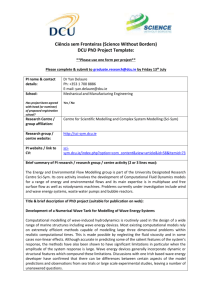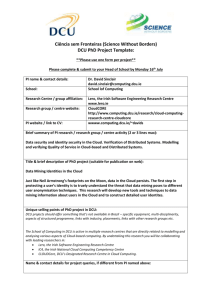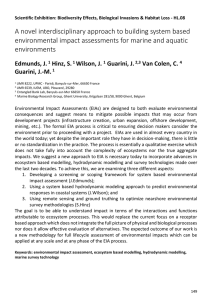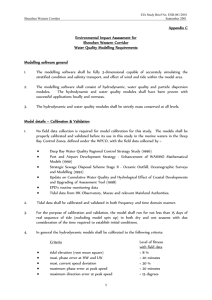Ciência sem Fronteiras (Science Without Borders)
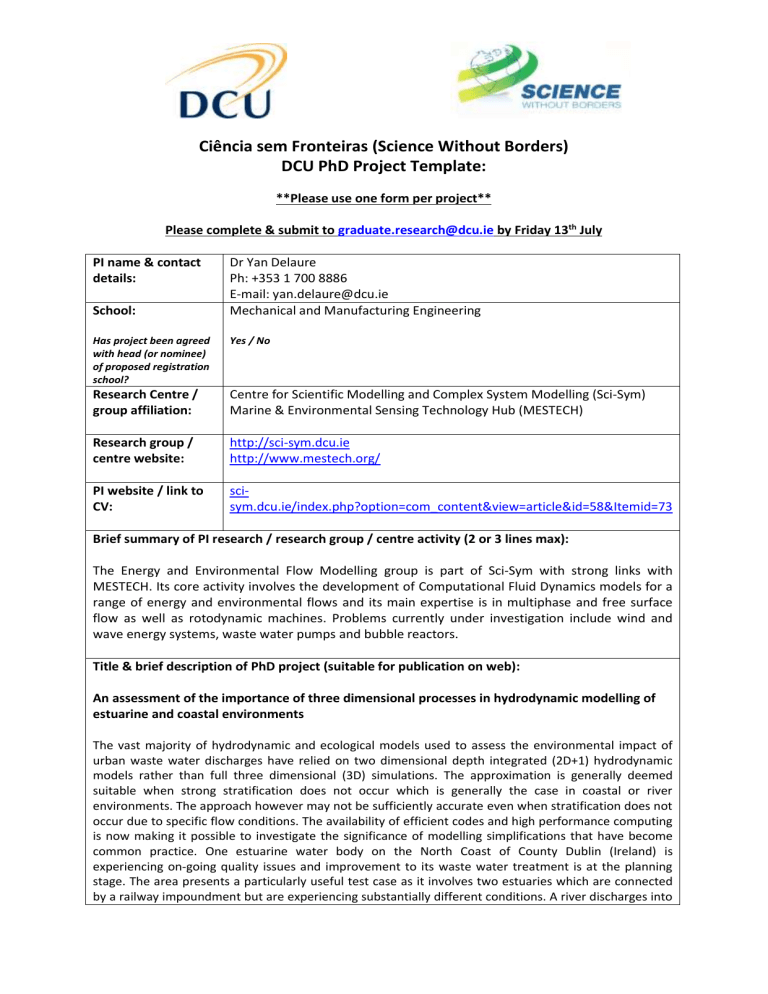
Ciência sem Fronteiras (Science Without Borders)
DCU PhD Project Template:
**Please use one form per project**
Please complete & submit to graduate.research@dcu.ie
by Friday 13 th July
PI name & contact details:
Dr Yan Delaure
Ph: +353 1 700 8886
E-mail: yan.delaure@dcu.ie
Mechanical and Manufacturing Engineering School:
Has project been agreed with head (or nominee) of proposed registration school?
Research Centre / group affiliation:
Yes / No
Centre for Scientific Modelling and Complex System Modelling (Sci-Sym)
Marine & Environmental Sensing Technology Hub (MESTECH)
Research group / centre website:
PI website / link to
CV: http://sci-sym.dcu.ie
http://www.mestech.org/ scisym.dcu.ie/index.php?option=com_content&view=article&id=58&Itemid=73
Brief summary of PI research / research group / centre activity (2 or 3 lines max):
The Energy and Environmental Flow Modelling group is part of Sci-Sym with strong links with
MESTECH. Its core activity involves the development of Computational Fluid Dynamics models for a range of energy and environmental flows and its main expertise is in multiphase and free surface flow as well as rotodynamic machines. Problems currently under investigation include wind and wave energy systems, waste water pumps and bubble reactors.
Title & brief description of PhD project (suitable for publication on web):
An assessment of the importance of three dimensional processes in hydrodynamic modelling of estuarine and coastal environments
The vast majority of hydrodynamic and ecological models used to assess the environmental impact of urban waste water discharges have relied on two dimensional depth integrated (2D+1) hydrodynamic models rather than full three dimensional (3D) simulations. The approximation is generally deemed suitable when strong stratification does not occur which is generally the case in coastal or river environments. The approach however may not be sufficiently accurate even when stratification does not occur due to specific flow conditions. The availability of efficient codes and high performance computing is now making it possible to investigate the significance of modelling simplifications that have become common practice. One estuarine water body on the North Coast of County Dublin (Ireland) is experiencing on-going quality issues and improvement to its waste water treatment is at the planning stage. The area presents a particularly useful test case as it involves two estuaries which are connected by a railway impoundment but are experiencing substantially different conditions. A river discharges into
the inner estuary while the outer estuary is connected to open sea with several sewage treatment works discharging in both parts. The 2D+1 and 3D hydrodynamic models Mike21 and Mike 3 from Danish
Hydraulic Institute will be used to assess the sensitivity of water quality models to the hydrodynamic modelling assumptions and to provide guidelines for the type of conditions. This assessment will rely on field measurement for both calibration and validation of the numerical model. The most suitable modelling tools will be used to test a range of effluent discharges under typical winter and summer conditions and to test impact of sea level rise.
Unique selling points of PhD project in DCU:
The PI and his research group have extensive experience of Computational Fluid Dynamics including free surface flows characteristic of marine environment. The group’s research is carried out at Sci-
Sym which is the DCU designated research centre for high performance computing and relies on access to Ireland’s supercomputers. The PI is also a member of MESTECH which is Ireland’s leading multi-disciplinary research hub, whose goal is to provide Ireland with research solutions to complex environmental problems and develop innovative new ideas and products for emerging markets. The group aims to partner with other world-class centres worldwide and to rapidly deliver these innovative solutions and services to the marine and environmental sector. On-going research at
MESTECH involves field measurements of water quality indicators including Chlorophyll, temperature, pH, turbidity and DO. These will be used to provide data for model validations. The project is also expected to be conducted in parallel to a separate collaborative study of changes to urban waste water treatment processes technologies aimed at improving cost and energy effectiveness.
Name & contact details for project queries, if different from PI named above:
Same PI as above
Please indicate the graduates of which disciplines that should apply:
Graduates with a strong background in Mechanical or Civil Engineering, Applied Mathematics or
Theoretical Physics can apply.
Ciência sem Fronteiras / Science Without Borders Priority Area:
Please indicate the specific programme priority area under which the proposed PhD project fits- choose only one (tick box):
Engineering and other technological areas
Pure and Natural Sciences (e.g. mathematics, physics, chemistry)
Health and Biomedical Sciences
Information and Communication Technologies (ICTs)
Aerospace
Pharmaceuticals
Oil, Gas and Coal x
Renewable Energy
Minerals
Biotechnology
Nanotechnology and New Materials
Technology of prevention and remediation of natural disasters
Biodiversity and Bioprospection
Marine Sciences x
Creative Industry
New technologies in constructive engineering
